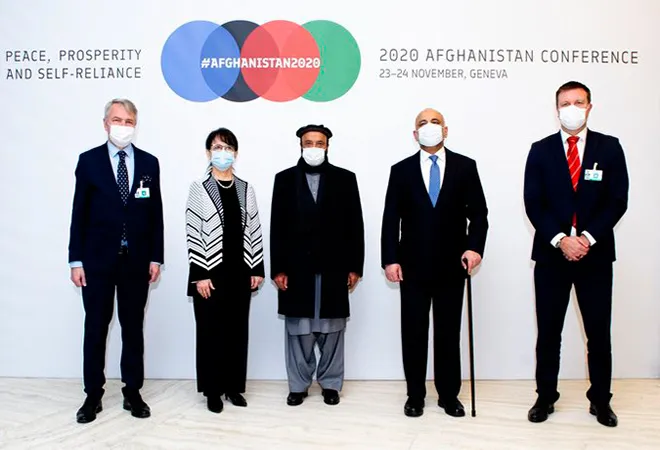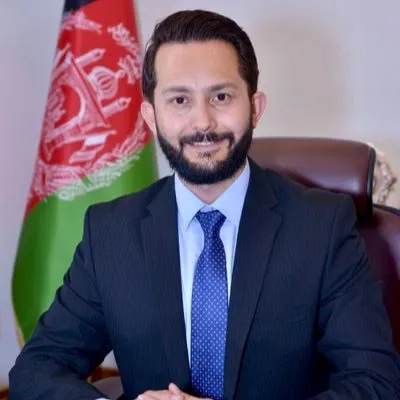
As a quadrennial ministerial pledging conference, the 2020 Afghanistan Conference, co-hosted by the Government of Islamic Republic of Afghanistan, the Government of Finland, and the United Nations took place virtually because of the serious Covid-19 situation in Switzerland this year, the whole discourse drew out some key takeaways worth considering. Afghanistan’s delegation was headed by Foreign Minister H.E. Mohammad Haneef Atmar. The conference took place with the theme “Peace, Prosperity, and Self-Reliance” amid fluidity and uncertainty in global geopolitics. While the contours of the talks remained more or less the same, the participation of representatives from 70 countries and 30 organizations discernibly highlighted the importance of the event. Furthermore, the severe financial woes that the world is witnessing because of the pandemic didn’t deter the global community to come forward and pledge over $13 billion as part of their continued support to Afghanistan. This also signifies that despite all the inroads that Afghanistan encountered, it successfully forged a global consensus.
The Corona Conundrum:
As every four years, this platform provides the opportunity to the international community and the Afghan Government to consolidate their commitment to the shared objectives of fostering sustainable development, prosperity, and peace in Afghanistan, this year marked some worrying trends that impacted the whole world. The first and foremost is the havoc wreaked by Covid-19 crisis, which took the entire global community off guard and unprepared. The said catastrophe severely damaged the world economy, putting a halt on the economic surge of various major economies throughout the world. Similarly, Afghanistan faced various new challenges and according to the World Bank its economy may contract by almost 5.5 percent in 2020. Despite all of this, the global community remained committed to witness self-reliant Afghanistan and extended assistance from food commodities to medical equipment during these testing times. On the outset of the conference, the Afghan Foreign Minister reiterated the need to bring an enduring peace in the country, and because the End State is the ultimate desire of the Afghan people, the pillars propping up the vital institutions of Afghan polity need to be constantly strengthened.
Afghanistan faced various new challenges and according to the World Bank its economy may contract by almost 5.5 percent in 2020. Despite all of this, the global community remained committed to witness self-reliant Afghanistan and extended assistance from food commodities to medical equipment during these testing times
Undergirding the Gains
Since 2001, Afghanistan has traversed a long way in terms of broadening its democratic base with increasing independent media, active civil societies, skilled demographic dividend and empowered women contributing in every aspect of country’s polity. The idea of the republic and the constitutional democracy have manifested in vigorously working government bodies and various social institutions. The trajectory of Afghanistan’s progress in the last 19 years can be better comprehended by making an analogy with one of the prominent stakeholders in this year’s conference: Finland. As a country which has one of the best World Human Capitals and which ranked first on the World Happiness Report consecutively in the last three years is also famous for one other reason: women empowerment. The Finnish Parliament is made up of 47 percent of women MPs and has set a new yardstick for the entire world for gender equality. In comparison, Afghan parliament has around 27 percent of women MPs. Besides, women’s presence is ubiquitous in the country, ranging from media, education, civil society, governance, entrepreneurship and even the Afghan National Defense and Security Forces (ANDSF). The orientation of this accomplishment is self-evident and justifies the need to continuously fortify the gains achieved over the past two decades. Further, the educated youth have been continuously strengthening the checks-and-balances in the administrative machinery of the country, improving the democratic set-up. In terms of economic developments, several outcomes have been observed since 2001 that include expanded access to water, sanitation and electricity, education, and health services. Today, His Excellency President Ashraf Ghani’s Economic Plan is perpetually diversifying the economic and financial base of the country as he aspires to change Afghanistan to the region’s roundabout where ideas, money and people will flow. Besides, the ANDSF that is bravely defending the country at various forefronts have incorporated professional tactical training and weaponry in its cache.
Concerted global efforts
The strategic geographical location of Afghanistan that was once the bustling important trade hub during the ancient Silk Route has the potential to impact the development throughout the region and the world. As President Ghani said that ‘the significance of our location can be best understood by the names given to us’, which includes the heart of Asia, gates of India, land bridge, roundabout and so on. As the political settlement which rests upon the End State that is acceptable to Afghan people, the region, and the world is desirable and for which the government has proactively been working, including the extant Peace Talks between the Islamic Republic of Afghanistan and the Taliban where the 21-member Afghan negotiating team is engaging head-on with the Taliban to bring sustainable peace in the country, the strengthened economic base is a must. Furthermore, President Ghani’s unconditional offer to the Taliban in 2018 equally justifies the unremitting efforts by the government of Afghanistan to bring political settlement at the earliest, for which a complete halt in violence is a requisite; however, the violence in Afghanistan by the Taliban and the Taliban-affiliated groups ever since has only increased despite all these positive efforts and initiatives. Nonetheless, as the Afghan National Security Advisor Hamdullah Mohib stated in the Conference that over 96 percent of the operations in the country are now being carried out by the Afghan National Defense and Security Forces (ANDSF) independently, it becomes all the more important for the world to continue their support to the Afghan military. And for the same reason, the commendable priceless contribution of the world community in Afghanistan is noteworthy. The main aim of such initiatives is to make Afghanistan self-reliant and for the same reason President Ghani has reiterated the need to support ‘the speeding up of regional projects, strengthening critical infrastructure, and digitizing the country,’ beside others.
The strategic geographical location of Afghanistan that was once the bustling important trade hub during the ancient Silk Route has the potential to impact the development throughout the region and the world
India’s role
India’s contribution in Afghanistan is always acknowledged and hailed by the Afghan people. Since 2001, India has invested over $US3 billion in Afghanistan, supporting almost every sector of Afghan society, polity, and economy. For peace efforts, India has always been steadfast in backing up the national narrative of the government of Afghanistan, where it time and again called for an ‘Afghan-led, Afghan-owned, and Afghan-controlled’ peace process. Continuing the legacy of this lionized bilateral bonhomie between the two countries, the Indian External Affairs Minister His Excellency S. Jaishankar in the current Geneva conference yet again pledged US$286 million for the construction of Shatoot Dam that will provide safe drinking water to 2 million Kabul residents and $80 million for 150 High-Impact Community Development Projects. Further, India has announced to continue providing resources for the existing programs in the country under the strategic partnership agreement, including 2,500 annual scholarships awarded to Afghan students by the Indian Council for Cultural Relations (ICCR). Such initiatives will bolster the domestic Afghan narrative for peace, while strengthening the vital institutions and improving the essential service delivery in the country.
India’s contribution in Afghanistan is always acknowledged and hailed by the Afghan people. Since 2001, India has invested over $US3 billion in Afghanistan, supporting almost every sector of Afghan society, polity, and economy
The way forward
The 2020 Afghanistan Conference yet again reinforced the global efforts in a concerted voice that will pave way to a secure, prosperous, and peaceful Afghanistan. And the successful execution of multitudinous projects envisioned for the future of the country will invariably open the gates of prosperity not only for Afghanistan, but the entire region and the world. Indeed, the international stakeholders of Afghanistan have been contributing unremittingly and vigorously to achieve the same. For we built upon the model painstakingly in the last two decades, let us continue striving for few more steps closer toward full realization of the potential.
The views expressed above belong to the author(s). ORF research and analyses now available on Telegram! Click here to access our curated content — blogs, longforms and interviews.




 PREV
PREV


